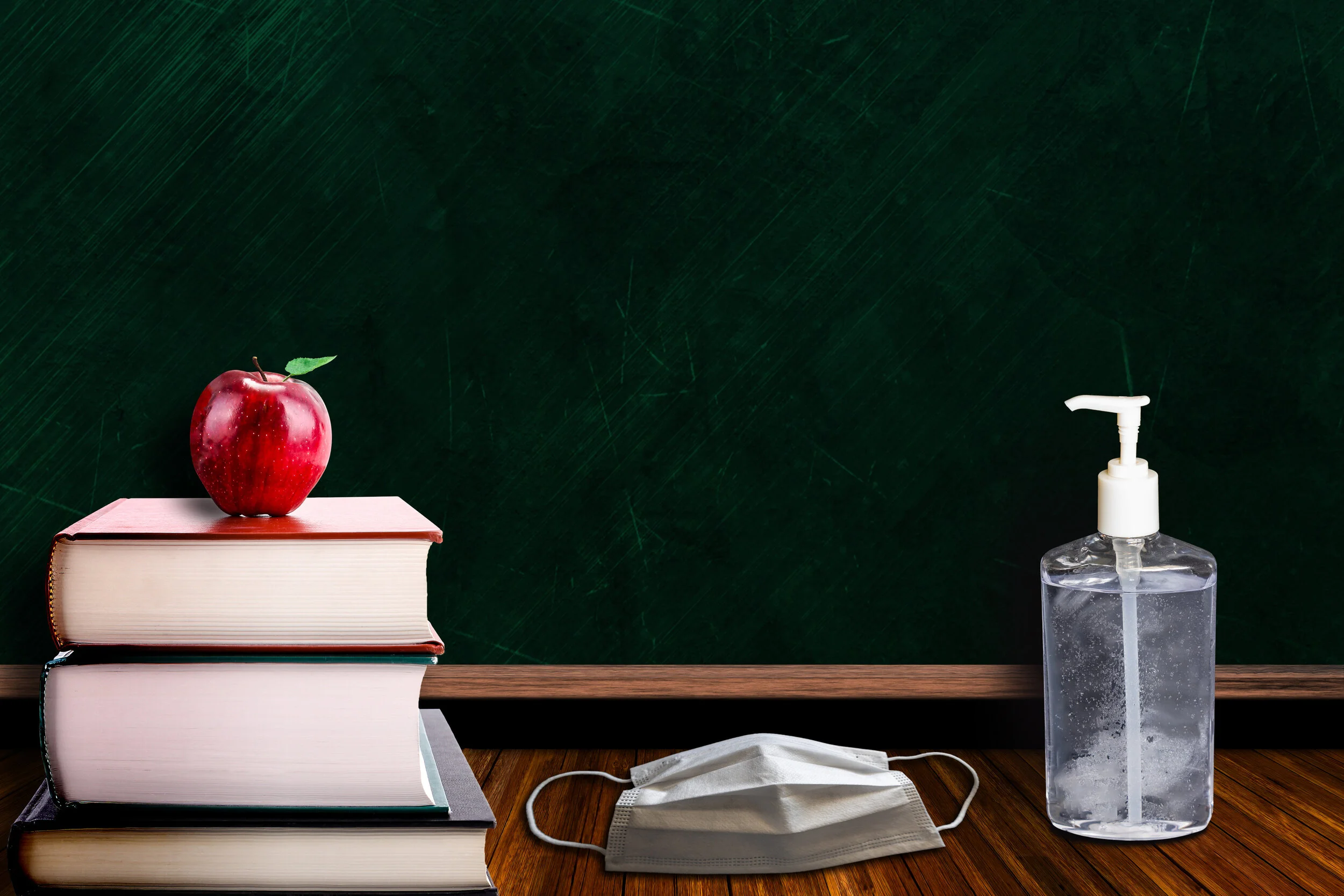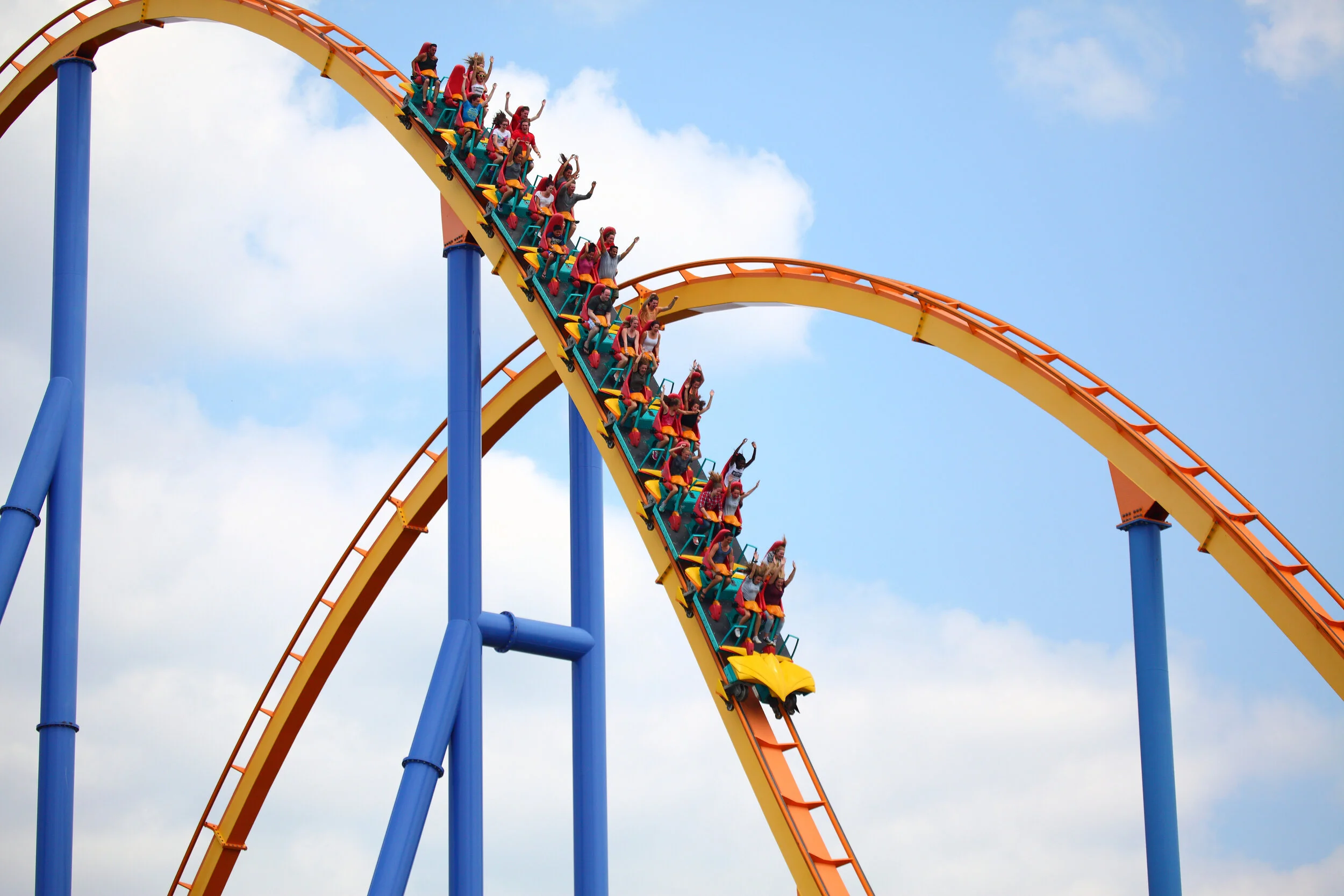How well can students learn while riding a roller coaster? What will their success look like this year?
The “new normal” of school in 2020
It’s likely to change and require us to be flexible in our expectations…..
BACK TO SCHOOL in the age of COVID. Are you worried about how well your kids will be able to learn this fall? How much do you expect them to learn? And what do you want them to learn? What are your worries?
The COVID pandemic, and the somewhat chaotic process of reopening with multiple school options, has highlighted and deepened these concerns, and the many emotions that accompany them. The school year is likely to engender a continuing roller coaster of emotions - hope, excitement, confusion, anxiety, stress - that will affect the way our kids learn.
When you first climb onto a roller coaster and start that uphill climb to the first plummet - you may feel a sense of both excitement and dread ,wondering if you made the right choice to go on the ride, if it’s going to be fun or terrifying, and perhaps, if it is too late to get off! Some feel exhilaration, some feel nausea. This year may feel a lot like that. You may feel any or all of those emotions at any given time. The person near you may be experiencing the same ride differently. Breathing, laughing, screaming all take on a different feeling during the sharp ups and downs, the twists and loops and curves.
(Full disclosure - personally, I dislike roller coasters. I hunch down and clutch the guard rail, while my friends laugh and throw hands in the air. Either way, we all survive, and all get off together at the end of the ride.)
How well can we learn, how well can we teach, while riding a roller coaster?
Whether your child is getting ready to physically jump back into a classroom, or preparing to try virtual/online learning this fall, uncertainty dominates our educational landscape. Parents and teachers are facing the stress of redesigning curricula and physical environments and wondering how this will all work! It’s on all of our minds as we read reports of college campuses closing, high schools with outbreaks, and online options rushing towards implementation.
First and foremost, an initial grounding statement; this year will simply be different. It will be different than other years, and different than what we had anticipated for our students of all ages. No amount of wishing, smiling, and school supply shopping will negate that reality. Acceptance is the first step in getting to the “now what?” or second phase, which is where our energies need to be focused! Importantly: “different” does not always mean “worse.” “Different” gives us space for reflection, reevaluation, improvement, and innovation. Seizing that opportunity gives space for resilience and growth.
I’ve had the privilege of meeting and speaking with many parents and teachers for lengthy conversations over the last few months. No one has perfect answers to these questions, but I’d like to offer some thoughts to ground the conversation.
Plan for change. No matter what model and expectations begin your 2020 school year, be prepared and assume that it will change during the year. There will be shifts and adjustments and flux, and we will all be challenged to respond to those changes as gracefully as possible, perhaps with short notice. When you speak to yourself, or your kids, about what to expect this year, using phrases like “When things change, we will readjust” or “When we notice how things are changing, we will have a backup plan” speaks of confidence, whereas saying “If things change” actually creates more anticipatory anxiety. Dr, Deborah Gilboa, a physician and speaker on resilience strategies, calls this the “When-not-if language.”
Visualize your backup plans and anticipate what you would need to make those plans work. Plan for change. Plan it in your own heart, in your concrete planning, and in your language.
Be prepared to be more proactive about monitoring your kiddo’s progress. “How will I know if my kid is actually learning this year?” This is a complex and layered question. How do you monitor if the learning model your child is following is actually hitting the marks? I’ll start with a very concrete answer (deeper thoughts to follow) - parents who are concerned about this will need to be more proactive than they have been in the past! Teachers struggling to create space for both in-person and online learning simultaneously may not be able to track each child’s progress as closely as they have in the past.
My dear friend Stephanie has been a special education director and classroom teacher in traditional classrooms, charter schools, and virtual programs and has designed individual curricula for kids with unique needs for years. She knows a lot about online learning, and how it differs from in-person, and how successful the model can be! She recommends that parents of K-12 students download the Minnesota standards (or your state’s equivalent) created to measure and ensure students hit the right marks on the MCA test. Download them, and take some time to read them over. Highlight the ones you think are the most important for your kid, and proactively follow along. This gives you some objective sense of how well your student is progressing.
3.Trust your child’s innate resilience. With calm guidance, kids really can adapt and make the best of many situations. Their young brains have far more neuroplasticity, the ability to rewire neurons in new patterns and responses, than adult’s brains. They adapt fast. They will be able to thrive and flourish if we can shepherd them through the initial frustration,
As Jody Picoult wrote in her novel My Sister’s Keeper, “The human capacity for burden is like bamboo - far more flexible than you’d ever believe at first glance.”
4. Consider taking a broader view of what education really means. “What if my kids’ test scores fall because the learning/teaching/curriculum/technology is less comprehensive?” I will reframe this question and ask you to consider, instead, “What is most important for my child to learn?” I invite you to take a deep breath, take a BIIIIG step back, and adjust your vision to a panoramic view of your child’s overall growth. For years, our educational mandate has forced our teachers and systems to adopt a “teach to the test” mentality, a frantic reliance on boosting our kids’ test scores (MCAs, SATs, ACTs, GREs) to meet policies and algorithms that control funding more than they benefit brain development. Those policies and test scores have shaped our parental expectations, our beliefs and our anxieties. If you currently fear that changes due to the pandemic may mean that your student’s SAT scores won’t be quite as high, or that their MCA may not move up quite as quickly as you had hoped - well, those fears are real, but they also reflect an underlying belief that may no longer serve us well. (Remember, many colleges are abandoning SAT and ACT requirements, as they have not been shown to predict success). Test scores are likely to drop as an indicator of a system that is struggling and evolving rapidly during a time of crisis. Disparities may widen. But that does NOT necessarily mean your child is not learning. A score is not what defines your kid; especially now.
I invite you to ponder and dream - what do I want my child to learn? What will success look like this year? Your answers to these questions will reflect your values, your family values, and your knowledge of your kid’s innate skills and values; you are an expert in your own child.
If you want to foster a curiosity and teach the scientific model of inquiry? (I originally trained as a biologist/virologist, so forgive me if I geek out about this subject…) In making decisions right now, we are starting by forming a “hypothesis” (for example, “given the information we currently have, I believe that in-school learning is right for you, with appropriate safety measures including...”). We need to express this hypothesis flexibly to our kids (and ourselves), then remain curious as new information comes in (How well are the physical safety boundaries working? How well is the teaching going?). As in any experiment, if that new data starts to show a clear risk or benefit different than expected, then the decisions can be changed, “parameters” adjusted, and then results reevaluated. This is a normal part of the process for any learning, and does not need to be tied to anxiety or negative judgment. Modeling this curiosity and reasoning for kids in a time of uncertainty will help empower them to formulate information in a logical and sequential way moving forwards.
If you want to foster resilience, a truly critical life skill - be there for the kids when their inevitable anxieties, questions and frustrations arise. Be ready to help them troubleshoot. Flexibility and courage and tenacity are all part of resilience. Kids will need your steady guidance and modeling. This includes you modeling how to make sure you are also attending to your own self-care!
If you want to foster authenticity - be ready to let them express all their emotions, the good, the bad, the pretty and the ugly - without judgment. They may feel detached, guilty, envious of other kids whose parents give them different opportunities, bored. Model the ability to call emotions by their names and communicate it. This will be an important year for kids to learn that even negative emotions are survivable. Not always a fun lesson, but another critical life skill.
Which underlying values do you want your kid to grow in the most? Structure and discipline? Independent learning? Curiosity? You have the chance to prioritize and help foster and mentor those skills. If you plan now, and plan for contingency changes, you can think about what resources you’ll need, what priorities you will set, and how to care for yourself to meet this challenge.
This is going to be a roller coaster year. I wish success and growth for all our kids, all of us, and believe our kids WILL learn and grow thanks to the ongoing dedication and support of teachers and parents.
Strap on your seatbelts - we are all riding the twists and curves of this roller coaster together. Reach out to me if you are interested in coaching to help you navigate the ride.




